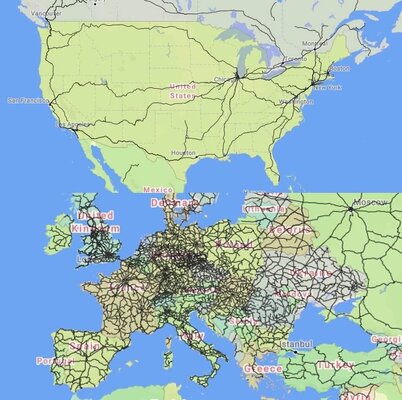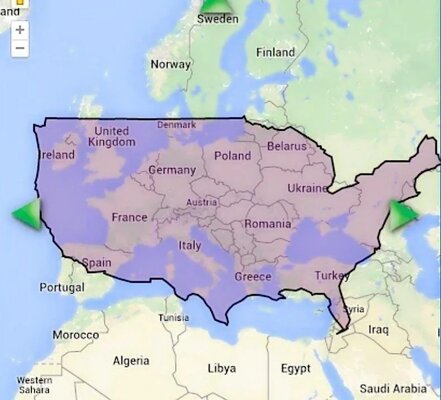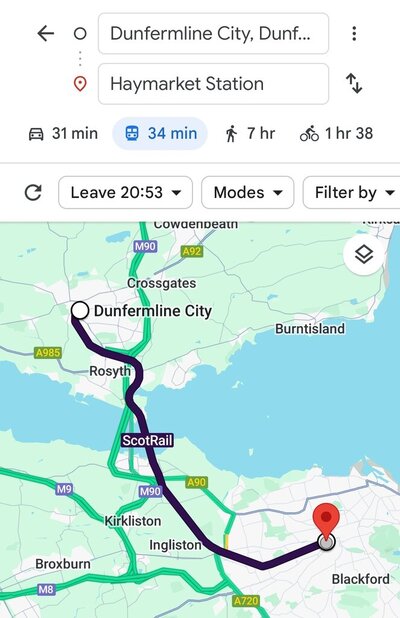You are using an out of date browser. It may not display this or other websites correctly.
You should upgrade or use an alternative browser.
You should upgrade or use an alternative browser.
Trains, Difference Between Europe and The US
- Thread starter Oldgator73
- Start date
The friendliest place on the web for anyone with an RV or an interest in RVing!
If you have answers, please help by responding to the unanswered posts.
If you have answers, please help by responding to the unanswered posts.
Chef Duane
Well-known member
The US is an automobile centric society. Most trains in the US carry bulk goods shipments. It doesn't seem there will ever be a time when the US shifts from cars to trains for large scale personal transportation. But the Europeans do have it down pretty well and the Japanese have truly perfected rail transport. Their shinkansen are fast and on time. And the rail stations are spectacular!
Tom
Administrator
- Joined
- Jan 13, 2005
- Posts
- 51,958
Ditto on the Japan railway system. I'd base myself in/near a major CIty such as Tokyo for a few weeks and travel everywhere by train. Shinkansen (bullet train) -> express train -> local/commuter train. Just don't get on a commuter train during commute time.The US is an automobile centric society. Most trains in the US carry bulk goods shipments. It doesn't seem there will ever be a time when the US shifts from cars to trains for large scale personal transportation. But the Europeans do have it down pretty well and the Japanese have truly perfected rail transport. Their shinkansen are fast and on time. And the rail stations are spectacular!
Grew up with British Rail and took the train to school every day. But the 'Dr. Beeching cuts' of the '60s destroyed the system.
Train tickets in the UK are extortionate.
Last year we took an Amtrak from New York to Richmond Virginia, about 300 miles for around $60 for the pair of us.
It cost nearly the same in the UK to travel return about 60 miles total journey. Amtrak had huge reclining seats, British rail, you were lucky to find a seat, and that was mid week off peak.
I can't comment for the rest of Europe, not been there and not interested in going there.
Last year we took an Amtrak from New York to Richmond Virginia, about 300 miles for around $60 for the pair of us.
It cost nearly the same in the UK to travel return about 60 miles total journey. Amtrak had huge reclining seats, British rail, you were lucky to find a seat, and that was mid week off peak.
I can't comment for the rest of Europe, not been there and not interested in going there.
John From Detroit
Well-known member
This is in part due to the Rail Companies.The US is an automobile centric society. Most trains in the US carry bulk goods shipments. It doesn't seem there will ever be a time when the US shifts from cars to trains for large scale personal transportation. But the Europeans do have it down pretty well and the Japanese have truly perfected rail transport. Their shinkansen are fast and on time. And the rail stations are spectacular!
More smaller passenger trains and more destinations would help
Also what I call "Auto Trains" where you do not park your car. you hand your keys to a "Porter" who l loads it on a car carrier car. Then you get on the passenger car ride cross country and a porter hands you your car keys. Those things woudl greatly increase train travel I suspect.
We have travelled extensively in Europe by train. Anything shorter than a 6 hour train ride is faster than taking a plane. Security is super fast and you arrive right down town as opposed to an hour outside of town and then have to take a cab. North America is still living in 1955 as far as transportation technology.
Tom
Administrator
- Joined
- Jan 13, 2005
- Posts
- 51,958
I recently watched a documentary on the Chunnel, quite amazing.The Chunnel ( rail tunnel under the channel to France) has rail cars you drive into and you stay in your car for the short journey to/from Calais
Oldgator73
Well-known member
We have taken the Chunnel on several occasions. Brought snacks and coffee. Very relaxing and fast. We lived in Cambridge and took the train to London many times. I think it was about 20 pounds at the time. Free parking too.
Tom
Administrator
- Joined
- Jan 13, 2005
- Posts
- 51,958
It's been many years since I rode a train in Europe or Scandinavia. My last recollection was getting off a train in IIRC Stockholm 10.00 at night, and tramping through the snow dragging my luggage. No sign of a cab and trying to find my way to the hotel.We have travelled extensively in Europe by train. Anything shorter than a 6 hour train ride is faster than taking a plane. Security is super fast and you arrive right down town as opposed to an hour outside of town and then have to take a cab. North America is still living in 1955 as far as transportation technology.
Gary RV_Wizard
Site Team
The US problem with train travel is that you still need a car or taxi to get around at most any destination. Only a few cities have local subways or commuter rail and America is extremely decentralized. Suburbs, bedroom communities, scattered shopping malls, etc. Even small airports manage by having a car rental services, but few train stations have that kind of infrastructure. And many train stations are shabby or located in dubious areas. The automobile made it easy for American cities & towns to have suburbs and widespread shopping and now we are trapped by it.
Shear distance is another factor. You can take a train from London to Budapest in about 16-18 hours, crossing 4 countries. The quickest express train from NYC to LA is nearly 3 days (68 hours). Typical European train trips are on the order of 100 or so miles. London to Edinburgh is a fairly long one at 330 miles, a little over 4 hours. Paris to Berlin about 8-9 hours.
Shear distance is another factor. You can take a train from London to Budapest in about 16-18 hours, crossing 4 countries. The quickest express train from NYC to LA is nearly 3 days (68 hours). Typical European train trips are on the order of 100 or so miles. London to Edinburgh is a fairly long one at 330 miles, a little over 4 hours. Paris to Berlin about 8-9 hours.
LarsMac
Well-known member
I traveled a bit in Europe on the trains. I liked it for getting around the Continent. It beat driving. Take an overnight train, wake up as you get close, and clean up and fresh clothes, stash you luggage at the station, get to the customer site, ready to roll. The Chunnel was OK, but security processes take a lot of the fun out of the experience.
Larry N.
Well-known member
Lots of good commentary above.
I can recall riding trains quite a bit when I was young, and it was nice travel, much better than plane or car in most long-haul cases. And you could meet some interesting people, too, and have time to get to know them a little. And for a kid, the train station was almost a magic place, as was the train itself. Still, the folks usually drove (even before Interstate Hwys) the 1,000 plus mile for our vacations, and we saw sights from Wash D.C. to California Redwoods and a LOT in between, and our train travel was usually when Mom & kids needed to go long haul but Dad still had to work. Ahhh... memories...
But today's experience in the U.S. is quite different. In any case, most Euro and Japanese travel doesn't usually go 2,000 miles plus.
I can recall riding trains quite a bit when I was young, and it was nice travel, much better than plane or car in most long-haul cases. And you could meet some interesting people, too, and have time to get to know them a little. And for a kid, the train station was almost a magic place, as was the train itself. Still, the folks usually drove (even before Interstate Hwys) the 1,000 plus mile for our vacations, and we saw sights from Wash D.C. to California Redwoods and a LOT in between, and our train travel was usually when Mom & kids needed to go long haul but Dad still had to work. Ahhh... memories...
But today's experience in the U.S. is quite different. In any case, most Euro and Japanese travel doesn't usually go 2,000 miles plus.
Free parking, them were the days. We even have to pay to park at a hospital now, even if you're having out patient treatment. On rare occasions, they might issue a car park waiver ticket but it's like winning the lottery.We have taken the Chunnel on several occasions. Brought snacks and coffee. Very relaxing and fast. We lived in Cambridge and took the train to London many times. I think it was about 20 pounds at the time. Free parking too.
RRR
Well-known member
I haven't been on a train since about 1968 and the trip from Portland, OR to Eugene, OR about 110 miles took seven flipping hours. The only reason that the group of us took a train was that we had discount tickets as one member of the group father worked for the RR. Spent more time on a siding then moving.
RRR
Well-known member
Profits before patients every time.Free parking, them were the days. We even have to pay to park at a hospital now, even if you're having out patient treatment. On rare occasions, they might issue a car park waiver ticket but it's like winning the lottery.
jymbee
Well-known member
Professor David
Well-known member
In addition to the amazing train system, Japan also has these amazing "luxury buses" which are super clean and comfortable...and relatively affordable. Luckily, I always had a friend or colleague to help me get around in the 3 times (total of about 4 months) that I've spend in Japan especially in large cities like Tokyo. Another huge plus is the trains and buses are almost always on time down to the minute.
Kirk
Well-known member
The most obvious difference between the US trains and those of other countries is their location.



